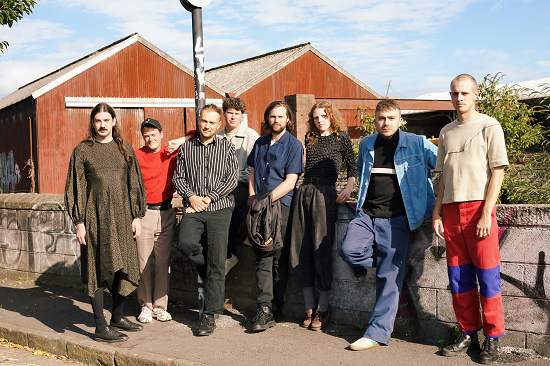When caroline released their beautiful debut single, ‘Dark blue’, in early 2020 – a transfixing riff looping around and around while a glorious muddle of drums and strings shoot and spark in all directions – I adored it. But it was only when its follow-up, ‘Skydiving onto the library roof’, arrived in June the next year that they became something crucial to me.
When ‘Skydiving’ came out, I had just found out that after a year-and-a-half I had been moved from a years-long NHS waiting list onto a 12-week in-person specialised psychotherapy program for trauma and PTSD. In the first session, the therapist leading it warned that the first few weeks would feel like shaking a snowglobe, and would lead to a considerable increase in mental distress before the flakes settle again. Also during that time, the dilapidated house I was renting was rendered uninhabitable by a boiler explosion, only a few days after my bedroom ceiling had caved in and ruined many of my possessions. The last full lockdown had just ended too, and the mood swings that came with readjustment were also intensely draining. I would end up taking time off work due to overwhelming mental exhaustion.
I do not think there’s anything particularly unique about that situation – the last two years in particular have been universally tough – and the idea of using music as a balm is nothing new. Yet although I was listening to plenty of different artists during this time, there was something particular about what caroline were doing on their two songs that made them different. They were not just calming or meditative, but essential to my mental survival. It was something about the way they moved, repetitious but organic, rather than machine-like.
On ‘Skydiving’, the band explore the idea of a ‘broken loop’, playing in great repeating waves but without any fixed tempo, and the result is a song that felt like enormous lungs taking heaving breaths in and out. The looping riff of ‘Dark blue’, which ticked along with contrasting regularity, felt like a heartbeat. I would listen to both on repeat on my way to and from therapy sessions, and at a time when I was mentally unanchored and frequently disassociating, their biological qualities reconnected me to life itself. The natural scenes on each single’s cover artwork – a desire path in a field of grass that’s yellowing in the sunshine for ‘Dark blue’, and the vast orange cliffs for ‘Skydiving’ – felt significant.
A few months later, I saw the band perform at Green Man festival. Boosted by the joy of reconnecting with old friends and live music for the first time after lockdown, I was in an altogether better mood, although a little concerned about caroline’s set. Their songs often hinge on the way profound moments of silence contrast with rushes of noise, and I struggled to see how that would translate to the unfocused hubbub of a festival. As expected, every time the group slipped back into quiet, the troughs before ‘Skydiving”s peaks, or the protracted period of languorous bass and skittering drums midway through the then-unreleased ‘Good morning (red)’, the sounds of playing children or the bands on other stages would creep in. To my delight, however, the set did not just succeed regardless – it thrived. It became clear that however much they had helped ease a period of personal hardship, the spaces of quiet in caroline’s songs didn’t necessarily just have to act as a counter to trauma. Their quiet parts could be a chance to meditate on joy, as much as distress.
It’s for that reason that by the release of their debut album six months on, those songs still feel so engaging. Such is their life-force that they can weave their way into whatever situation they please. It helps, too, that their music is so texturally rich. Much has been made of the way the band’s sound draws on Appalachian folk, Midwestern emo, noise rock and choral singing, but it is important to note that they don’t simply mash those influences together. The chiming guitar on ‘IWR’ might recall an old folk song, and the opening vocal line of ‘Skydiving’ might conjure a church chorister, but the references feel subconscious. caroline primarily write their songs on an improvisational basis, first in sessions with core trio Jasper Llewellyn, Casper Hughes and Mike O’Malley, and then in a developmental period with the full eight-piece band. In such a long and layered process it is inevitable that references might arise. What’s most important is that they are presented as incidental; their songs feel delicately ordered with whatever sounds they find appropriate.
As well as ‘Skydiving’, ‘Dark blue’ and ‘Good morning’, the record consists of three more long-form songs. The first is ‘IWR’ (which stands for ‘I Was Right’), the group’s most straightforwardly beautiful song on which a lengthy repeated vocal line, sung as a group, serene flowing violins, and repetitious chiming guitars all lattice together. ‘Engine’, meanwhile, consists of one crescendo after another, the gaps between them shortening as the song progresses until the music is a grand, clattering mess. Closing the album is ‘Natural death’. Its first half is stark, just a fragile vocal and uneasy scratches of violin, and its second sees the band dive into complete abstraction, arrhythmic guitar chords, anchorless vocals and crashing cymbals, clattering against one another all out of time; it’s as if the record’s coming apart at the joints, the constituent parts that the band had suspended in mid-air as a beautiful whole now plummeting down piece by piece.
Between the longer songs are four much shorter pieces, only one of which is greater than two minutes in length. Usually they consist of a single idea: ‘Desperately’ is a resonant cello-and-vocal performance, ‘Messen #7’ and ‘Zilch’ are avant-garde solo guitar tracks, and ‘Hurtle’ is a single churning riff repeated over and over. Their simplicity makes for a stark juxtaposition with the longer pieces, and they act like aural palette cleansers, a reset after which the next long-form emotional wave can hit with extra clarity. The success of the entire record is ultimately down to this balancing act, where the band manage to provide both overwhelming waves of noise, and the space to take them in. There are plenty of exhalations of emotion on caroline’s debut album, but the inhalations are just as important.



